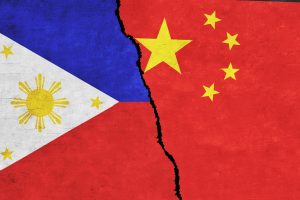China and the Philippines yesterday held a meeting aimed at easing the tensions in the South China Sea, following a major clash on June 17 in which Chinese and Philippine personnel came to direct physical blows at a disputed shoal.
In a statement issued last night, the Department of Foreign Affairs (DFA) said that Philippine Foreign Affairs Undersecretary Maria Theresa Lazaro and Chinese Vice Foreign Minister Chen Xiaodong met in Manila in line with the existing Bilateral Consultation Mechanism on the South China Sea.
The pair “had frank and constructive discussions” on the situation in the South China Sea, and “affirmed their commitment to de-escalate tensions without prejudice to their respective positions,” the DFA said.
It added that “there was substantial progress on developing measures to manage the situation at sea, but significant differences remain.” During the meeting, the DFA said, Lazaro stressed that the Philippines would be “relentless in protecting its interests and upholding its sovereignty, sovereign rights, and jurisdiction in the West Philippine Sea.”
The Chinese delegation “urged the Philippine side to immediately stop the infringing and provocative acts in the sea” and “work with China in managing the situation in Ren’ai Jiao to promote de-escalation of the situation and stabilization of bilateral ties,” as a Chinese state media report put it. (Ren’ai Jiao is the Chinese name for Second Thomas Shoal, which Manila refers to as Ayungin Shoal.)
The talks came two weeks after a major clash on June 17, in which the China Coast Guard blocked a resupply mission to the Philippine garrison stationed on Second Thomas Shoal in the Spratly Islands.
During the operation, China Coast Guard personnel on motorboats repeatedly rammed and then boarded two Philippine rigid-hulled inflatable boats that were delivering supplies, including firearms, to the BRP Sierra Madre, a warship that Manila grounded on the shoal in 1999. In the ensuing melee, a number of Filipino navy personnel were wounded, including one who reportedly lost his right thumb. The Philippine military later likened the incident to “an act of piracy.”
The June 17 incident marked the culmination of nearly two years of growing tensions over the shoal, which China appears to have singled out as potentially the most vulnerable of the nine Philippine-occupied features in the Spratly Islands. Since the start of this year especially, it has gone to increasingly forceful lengths to prevent the Philippines from resupplying the small contingent of marines aboard the Sierra Madre.
In light of the recent violent confrontation at the shoal, renewed diplomatic engagement is welcome. While the Bilateral Consultation Mechanism has been in place for some time – yesterday’s meeting was the ninth to be held under its aegis – Chinese and Philippine officials have been largely talking past each other in recent months, dueling in public statements that have been by turns dismissive and highly emotional.
One round of talks is no salve to the mistrust that has developed, and the mutually incompatible claims that underpin it. China is not about to give up its expansive claims to the South China Sea; nor will Manila concede these claims in violation of its own, much more legally-grounded claims. But talks at least improve the chances the two nations will establish a new status quo – one that will prevent each Philippine resupply mission to Second Thomas Shoal from becoming a test of wills with the potential of spiraling into a wider conflict.

































